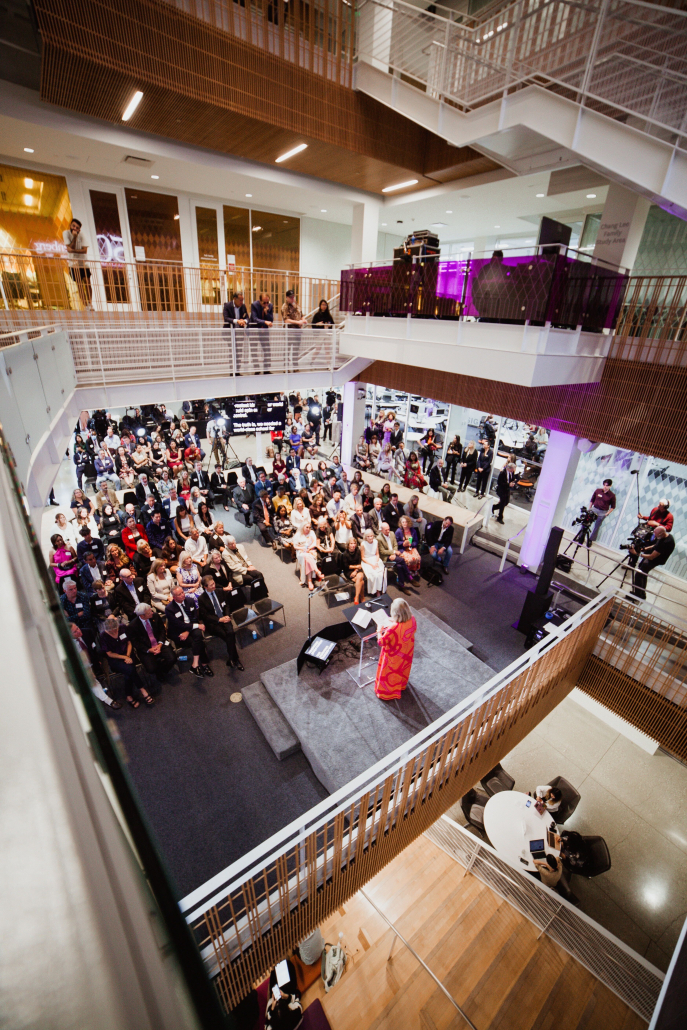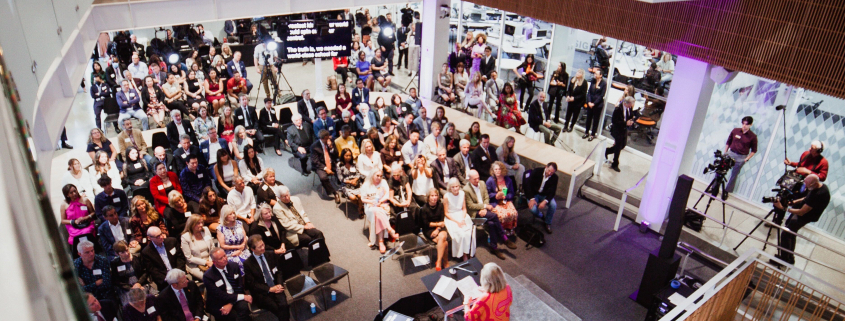Annenberg celebrates 50 years

The 50th Anniversary celebration of the Annenberg School for Communication and Journalism was held at Wallis Annenberg Hall Tuesday, and included speeches from Dean Willow Bay, President Carol Folt and Chairman of the Board, President and CEO of the Annenberg Foundation Wallis Annenberg. A number of students and guest speakers also joined them.
“Plenty of people thought the idea of a school for communication was a little bit silly,” Annenberg said while reminiscing during her speech.
Founded in 1971 with the support of the late University Ambassador Walter H. Annenberg, the school aimed to provide students with the tools to lead the world into a new age of media.
Under the guidance of former dean Geoffery Cowan, the school officially integrated journalism in 1994. Ernest J. Wilson III served as dean from 2007 until 2017, during which he digitized the program for the modern age and helped open Annenberg Hall. Then, for the 2009 school year, the USC Board of Trustees voted to change the school’s name from the USC Annenberg School for Communication to the USC Annenberg School for Communication and Journalism.
Annenberg spoke about her philanthropy efforts and how communication and the spread of information has become more important than ever before since the school’s inception in the 1970s.
“If we don’t learn to harness [communication] and change it to our greatest ideals, our world could spin out of control,” she said.
Annenberg concluded her speech by underlining the school’s goals going forward.
“Around the world, our most fundamental institutions — democracy, human rights and a free press — are under siege,” she said. “The way we fight back is by training and sustaining the next generation of leaders, journalists, and communicators. We’re not just teaching communication at this school. We’re teaching freedom itself.”
After her speech, Annenberg presented Dean Bay and former deans Wilson III and Cowan with a gift of $250,000 for their understanding of “what this school could be, and help[ing] it to change with the changing times.” Guests then made their way to an outdoor dinner.
A number of students from various years and programs also spoke at the event. Ho-Chun Herbert Chang, a Ph.D. candidate in communications, discussed his research on generating algorithms that can better facilitate online conversations to preserve the integrity of social media.
“As social media grows more advanced, branching into virtual reality with AI bots, I believe it’s research like mine that will have an impact on decades to come to proactively design social media to preserve the truth,” Chang said.
He later elaborated on Annenberg’s future role in these changes.
“Annenberg is very-well positioned to lead the efforts that combine both research and algorithms and users to discuss things about social media,” he said.
Mariela Gomez, a first-generation master’s student in journalism, was born in Salinas, California to a family of farm workers. Growing up, she said, the news she watched did not reflect her community.
“Crime news dominated the airways, failing to convey the resiliency, strength and thriving of my family and community,” Gomez said.
It was this experience that inspired her to go into journalism, wanting to bring more diversity to the field and broaden the scope in which stories are told.
“I hope to see [Annenberg] continue singling out students with diverse experiences, races, class, gender, all of that,” Gomez said.
Mike Huckman, a guest speaker and Annenberg alumnus — who since graduating in 1983 has worked in broadcast journalism for nearly two decades — said the caliber of the program at Annenberg and its students impressed him.
“I think it’s places like USC Annenberg where the future of communication, of journalism, of digital, of all these things is going to be reimagined over and over and over again,” Huckman said.
Folt echoed a message of continued dedication towards truth and transparency throughout the night during her speech and with the student press.
“If we ever needed people to stand up to misinformation and disinformation, people to fight for truth, this is that moment, and we can’t lose sight of the importance of discovery in getting that right,” Folt said. “This school was built for that.”

